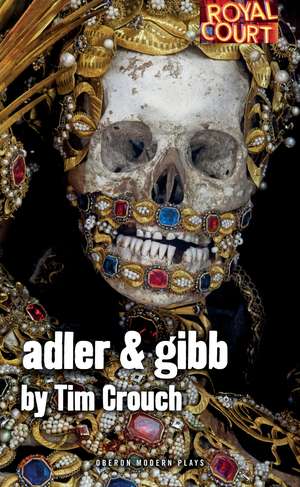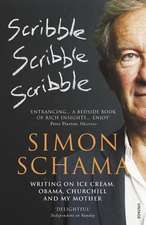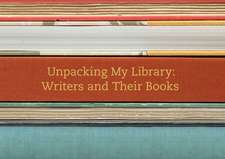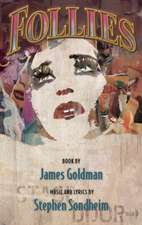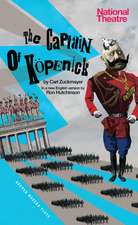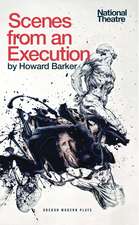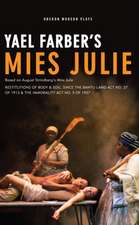Adler & Gibb: Oberon Modern Plays
Autor Tim Crouchen Limba Engleză Paperback – 31 mai 2014
Din seria Oberon Modern Plays
-
 Preț: 94.83 lei
Preț: 94.83 lei - 22%
 Preț: 53.94 lei
Preț: 53.94 lei - 22%
 Preț: 129.35 lei
Preț: 129.35 lei -
 Preț: 94.83 lei
Preț: 94.83 lei - 20%
 Preț: 56.34 lei
Preț: 56.34 lei -
 Preț: 92.78 lei
Preț: 92.78 lei - 22%
 Preț: 61.38 lei
Preț: 61.38 lei -
 Preț: 93.78 lei
Preț: 93.78 lei - 23%
 Preț: 59.87 lei
Preț: 59.87 lei - 23%
 Preț: 65.88 lei
Preț: 65.88 lei - 14%
 Preț: 79.74 lei
Preț: 79.74 lei -
 Preț: 92.78 lei
Preț: 92.78 lei - 19%
 Preț: 66.32 lei
Preț: 66.32 lei - 19%
 Preț: 66.32 lei
Preț: 66.32 lei -
 Preț: 91.29 lei
Preț: 91.29 lei - 23%
 Preț: 53.13 lei
Preț: 53.13 lei - 14%
 Preț: 59.51 lei
Preț: 59.51 lei - 23%
 Preț: 66.60 lei
Preț: 66.60 lei - 14%
 Preț: 60.41 lei
Preț: 60.41 lei -
 Preț: 95.24 lei
Preț: 95.24 lei -
 Preț: 86.15 lei
Preț: 86.15 lei -
 Preț: 94.64 lei
Preț: 94.64 lei -
 Preț: 93.37 lei
Preț: 93.37 lei - 23%
 Preț: 53.13 lei
Preț: 53.13 lei - 22%
 Preț: 54.83 lei
Preț: 54.83 lei -
 Preț: 104.09 lei
Preț: 104.09 lei -
 Preț: 95.87 lei
Preț: 95.87 lei -
 Preț: 94.83 lei
Preț: 94.83 lei -
 Preț: 95.24 lei
Preț: 95.24 lei -
 Preț: 92.78 lei
Preț: 92.78 lei - 19%
 Preț: 65.88 lei
Preț: 65.88 lei - 15%
 Preț: 65.44 lei
Preț: 65.44 lei - 14%
 Preț: 66.78 lei
Preț: 66.78 lei - 23%
 Preț: 65.88 lei
Preț: 65.88 lei -
 Preț: 94.83 lei
Preț: 94.83 lei - 14%
 Preț: 59.51 lei
Preț: 59.51 lei - 14%
 Preț: 66.32 lei
Preț: 66.32 lei - 14%
 Preț: 59.96 lei
Preț: 59.96 lei - 13%
 Preț: 67.83 lei
Preț: 67.83 lei -
 Preț: 55.69 lei
Preț: 55.69 lei - 23%
 Preț: 65.69 lei
Preț: 65.69 lei - 14%
 Preț: 65.88 lei
Preț: 65.88 lei - 22%
 Preț: 53.85 lei
Preț: 53.85 lei -
 Preț: 94.64 lei
Preț: 94.64 lei -
 Preț: 94.01 lei
Preț: 94.01 lei - 15%
 Preț: 65.17 lei
Preț: 65.17 lei - 21%
 Preț: 62.98 lei
Preț: 62.98 lei -
 Preț: 95.05 lei
Preț: 95.05 lei -
 Preț: 95.24 lei
Preț: 95.24 lei -
 Preț: 113.37 lei
Preț: 113.37 lei
Preț: 68.54 lei
Nou
Puncte Express: 103
Preț estimativ în valută:
13.12€ • 13.64$ • 10.83£
13.12€ • 13.64$ • 10.83£
Carte tipărită la comandă
Livrare economică 14-28 aprilie
Preluare comenzi: 021 569.72.76
Specificații
ISBN-13: 9781783190928
ISBN-10: 1783190922
Pagini: 96
Dimensiuni: 130 x 210 x 13 mm
Greutate: 0.25 kg
Ediția:New.
Editura: Bloomsbury Publishing
Colecția Oberon Books
Seria Oberon Modern Plays
Locul publicării:London, United Kingdom
ISBN-10: 1783190922
Pagini: 96
Dimensiuni: 130 x 210 x 13 mm
Greutate: 0.25 kg
Ediția:New.
Editura: Bloomsbury Publishing
Colecția Oberon Books
Seria Oberon Modern Plays
Locul publicării:London, United Kingdom
Notă biografică
Tim Crouch's credits at the Royal Court include The Author, which toured across the UK and abroad throughout 2010 and 2011. Other credits include what happens to the hope at the end of the evening, co-written with Andy Smith, in which Tim also performed at the Almeida Festival, I, Cinna (The Poet) as part of the RSC's World Shakespeare Festival, at the Swan Theatre. He edited and directed The Taming Of The Shrew and King Lear for the RSC's Young People's Shakespeare Project. His other credits include I, Malvolio, My Arm, England and An Oak Tree, which won an Obie Award. As a director, his credits include King Lear and The Taming of the Shrew for the RSC's First Encounters: Shakespeare for Young Audiences.
Recenzii
...when one has penetrated the formal barrier, one finds that Crouch is delivering some fascinating propositions: that all art is the product of a particular culture, that today we are more obsessed by the life than the work and that we fetishise anything related to the artist.
...a thrilling experiment... This simple story gives Crouch the chance to joyfully satirise academic descriptions of artistic creativity, and to comment on how film-makers, art critics and biographers vampirise the lives of artists. But as well as laughing at the blood suckers who slurp the life out of creativity, Crouch also explores the nature of theatre, and theatrical representation.
It's ambitious, both theatrically and intellectually, but what these theatre-makers are adept at doing is leaving room for concepts to circulate. The ambling setup of the first half might leave some fidgeting in their seats, but the slow delivery and long silences give priority to the play's groaning raft of ideas. Those ideas are swirling and slippery, taking up fluid residence in the mind. Adler & Gibb picks at notions of artistic value, of the relationship between art and meaning, of the relationship between art and life.
Crouch's distinctive, seriously mischievous fusing of formal experiment and ethical investigation is taken a stage further in Adler & Gibb... which plays pointed games with the rules of representation while skewering the monstrous presumption of wanting to invade and appropriate another person's reality... Not an easy show, but a memorable and rewarding one.
Crouch has fun here at the expense of the various kinds of people who live off the creativity of others like parasites. He satirises the opaque judgments of scholars, the tedious ambivalence of critics and the mad devotion of fans... And as in his previous work, Crouch wants us to ask probing questions about the institutions (such as the Royal Court) where we experience art.
...a thrilling experiment... This simple story gives Crouch the chance to joyfully satirise academic descriptions of artistic creativity, and to comment on how film-makers, art critics and biographers vampirise the lives of artists. But as well as laughing at the blood suckers who slurp the life out of creativity, Crouch also explores the nature of theatre, and theatrical representation.
It's ambitious, both theatrically and intellectually, but what these theatre-makers are adept at doing is leaving room for concepts to circulate. The ambling setup of the first half might leave some fidgeting in their seats, but the slow delivery and long silences give priority to the play's groaning raft of ideas. Those ideas are swirling and slippery, taking up fluid residence in the mind. Adler & Gibb picks at notions of artistic value, of the relationship between art and meaning, of the relationship between art and life.
Crouch's distinctive, seriously mischievous fusing of formal experiment and ethical investigation is taken a stage further in Adler & Gibb... which plays pointed games with the rules of representation while skewering the monstrous presumption of wanting to invade and appropriate another person's reality... Not an easy show, but a memorable and rewarding one.
Crouch has fun here at the expense of the various kinds of people who live off the creativity of others like parasites. He satirises the opaque judgments of scholars, the tedious ambivalence of critics and the mad devotion of fans... And as in his previous work, Crouch wants us to ask probing questions about the institutions (such as the Royal Court) where we experience art.
